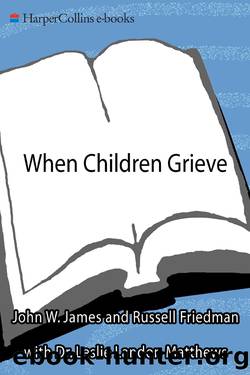When Children Grieve by John W. James

Author:John W. James [John W. James and Russell Friedman With Dr. Leslie Landon Matthews]
Language: eng
Format: epub
ISBN: 9780062015488
Publisher: HarperCollins
FORGIVENESS IS AN ACTION, NOT A FEELING
Many people say, âI canât forgive him; I donât feel it.â We agree, because you cannot feel something you have not done. More clearly, you cannot feel forgiveness until you take the actions of forgiveness. A feeling of forgiveness can only result from the action of verbalizing the forgiveness. Action first, feeling follows. If you teach your children the effective use of forgiveness, you have given them a life-affirming skill.
Forgiveness is relinquishing the resentment children hold against another person. They might need to forgive them for something they actually did: I forgive you for ruining my birthday party. On the other hand, they might need to forgive them for something they did not do: I forgive you for not attending my graduation.
There is another expression that people use. âI can forgive, but I canât forget.â We have watched people use this awkward combination of ideas to stop themselves from gaining the freedom that is the by-product of forgiveness. Imagine that you had been horribly beaten over a period of many years. It is unlikely that you would ever forget those incidents. But lack of forgiveness of the perpetrator keeps your pain current and alive. Forgiveness does not take away the memory, it takes away the pain.
The implication of âI can forgive, but I canât forgetâ is that âsince I cannot forget, I will not forgive.â The real questions are: Who stays in an emotional prison cell? Who continues to resent and shut down their own mind, body, and heart? Whose life is limited by the absence of forgiveness?
Use this new awareness about the value of forgiveness to enhance your childrenâs lives.
We are often asked the following question: In dealing with living people, is it appropriate to forgive someone in person? Our response: Absolutely not! An unsolicited forgiveness will almost always be perceived as an attack. The person being forgiven need never know that forgiveness has occurred. Remember, never suggest that your children forgive anyone directly to their face.
One more note: Many people ask others to forgive them and teach their children to do the same. We think this is an incorrect communication. In fact, it is a manipulation by which you ask the other person to do something that you need to do. And when you ask someone who has died to forgive you, you are asking a dead person to take an action. Children need to take an action, not ask someone else to do it for them. If children ask for forgiveness, they are trying to apologize for something they have said or done. It is much better for them to make an apology than to ask for forgiveness. That way they can feel more complete.
Letâs take everything you just read about forgiveness and look at the little boyâs comment to his hamster one more time: âI was mad the time you bit me, but thatâs okay.â In effect, the little boy has issued a perfect statement of forgiveness. The phrase âthatâs okay,â is a statement of perspective.
Download
This site does not store any files on its server. We only index and link to content provided by other sites. Please contact the content providers to delete copyright contents if any and email us, we'll remove relevant links or contents immediately.
Rewire Your Anxious Brain by Catherine M. Pittman(18654)
Talking to Strangers by Malcolm Gladwell(13370)
The Art of Thinking Clearly by Rolf Dobelli(10487)
Mindhunter: Inside the FBI's Elite Serial Crime Unit by John E. Douglas & Mark Olshaker(9339)
Becoming Supernatural by Dr. Joe Dispenza(8214)
Change Your Questions, Change Your Life by Marilee Adams(7780)
Nudge - Improving Decisions about Health, Wealth, and Happiness by Thaler Sunstein(7706)
The Road Less Traveled by M. Scott Peck(7601)
The Lost Art of Listening by Michael P. Nichols(7506)
Mastermind: How to Think Like Sherlock Holmes by Maria Konnikova(7342)
Enlightenment Now: The Case for Reason, Science, Humanism, and Progress by Steven Pinker(7311)
Win Bigly by Scott Adams(7194)
The Way of Zen by Alan W. Watts(6614)
Daring Greatly by Brene Brown(6512)
Big Magic: Creative Living Beyond Fear by Elizabeth Gilbert(5771)
Grit by Angela Duckworth(5614)
Ego Is the Enemy by Ryan Holiday(5445)
Men In Love by Nancy Friday(5239)
The Laws of Human Nature by Robert Greene(5208)
